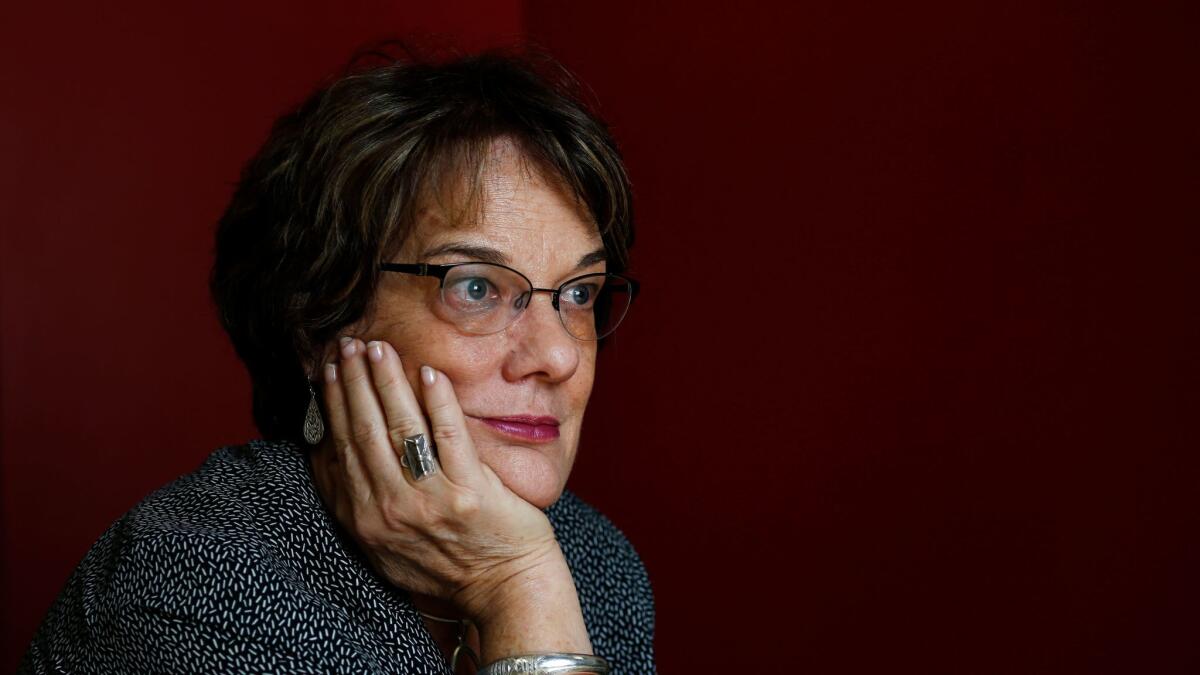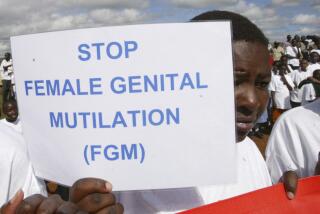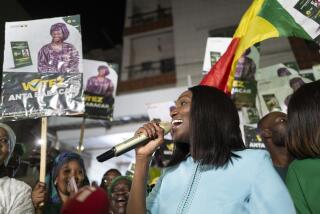Q&A:: A Senegal-based humanitarian group helps African communities reject harmful practices against women

- Share via
As Molly Melching looks at the work done by her human rights group, Tostan, in Africa during the last 26 years, she’s especially proud of some key milestones:
More than 20,000 women in eight African countries where the group has worked have been selected for leadership positions in their communities.
At least 7,500 communities have publicly declared that girls will not become child brides.
And 3 million-plus people live in communities that have declared an end to female genital excision — the practice of cutting or removing some or all of the external female genitalia. Ending this ritual has become a focus of the Dakar, Senegal-based organization, whose name means “breakthrough” in the local Wolof language.
The group — among a multitude of organizations, charities and grass-roots initiatives working to stop genital excision — promotes women’s rights, health, education and economic empowerment. Funded by the United Nations Children’s Fund, the U.N. Population Fund, the countries of Norway and Sweden and private donors, the program’s curriculum is based on fostering respect for human rights.
Melching, the group’s founder and chief executive, hails from near Champaign-Urbana, Ill., and first arrived in West Africa as a graduate exchange student in 1974 looking to study African literature written in French. In a recent interview with The Times, Melching explained the organization’s strategy.
The interview has been edited for length and clarity.
How and why did female genital excision, or genital cutting as Tostan refers to it, become a key focus?
That was not even in the curriculum in the beginning.
We did the program for eight years, and then the women came to us and said, “We’ve studied many things — vaccination, diarrhea, leadership, economic empowerment — but we don’t know enough about our own bodies and our own development. Please do a module on women’s health.”
We started researching with them and found that many of the problems related to health and women and girls were dependent, not so much on the information, but on them knowing they have the human right to health, that they have the human right to be free from all forms of violence, and that they have the right to speak out, to voice their opinion.
It was the women themselves who said, “We want to know about [female genital cutting]. We want to learn about it.”
I was a bit hesitant as a white American woman going in to discuss this, but the women said we must talk about it. [They said,] “We want to know, is it really necessary? We’ve heard that it is a religious practice. Is that true?”
So we included it in our curriculum. Never did we dream, ever, that it would lead to this great movement across West Africa of women and men and youth standing up and saying it is time to abandon a practice which harms.
What have been the main challenges in convincing those who view the practice as a tradition to abandon it?
In the beginning, we started with women’s rights. That was a mistake because it made men suspicious. [They wondered,] “What are they doing with these women? And what about our rights?” That was in 1996, 1997. We found that the men were so angry at times they actually closed classes.
This is not at all what we had hoped for in talking about human rights. So we started thinking we should be more inclusive. We needed to include men and women and children. And this is what we did.
In 2000, we totally rewrote our program. We made human rights the foundation of our program. [Participants] started thinking about things they had never discussed before, such as an experience they went through where they were discriminated against and how they felt and how this can lead to such pain and suffering, and even to frustration and conflict and anger between families.
Participants in our program identified female genital cutting as a violent act, as being an act that was not necessary. We collectively decided that we would not accept this any longer, this discrimination, this violence.
Was there pushback?
The pushback was from [Muslim] religious leaders who believed that this was a religious practice. They went to some of their mentors, their spiritual leaders, and asked questions. And they found out that this is nowhere in the Koran. They had they just assumed that this was their religious practice.
We had many religious leaders come on board early on. But there were others that were more resistant and were angry, even though we included them in the human rights work we were doing.
What we finally have come to understand is that [religious leaders] can be even greater allies, that they can actually help to lead this movement and are proud and happy to do so, but it takes a longer period of time.
So we now do five- to 10-day training, before we start our program, with the religious leaders so that they can see how the teachings we do are all about health and well-being and helping people to achieve their goals and maintain the values that are important — family and unity and generosity — all the beautiful elements of African society that we don’t want to lose.
How do you gauge success of the program?
We gauge success because people decide to abandon [harmful] practices. The religious leaders do sermons in the mosques on Friday. They do public declarations. At marriages and baptisms, they speak of how important it is for a family to promote health within the family and to do that they must think of stopping all practices that could harm their children.
What we do in our training center is not only for Senegal and the five other countries where we work — Mauritania, Mali, Guinea, Guinea-Bissau and Gambia (Tostan previously also had programs in Somalia and Djibouti) — we’ve had people from all over Africa.
We’ve [also] had people from Pakistan, India, Nepal, Haiti, who’ve come and have said this is a different approach. It’s a different paradigm. It’s not about blame and shame. It’s not about imposing ideas. It’s about saying to people this is the information you need to make good decisions and decisions that will help you to reinforce your goals and your values for the future.
So is female genital excision still prevalent in West Africa?
Yes. With any social movement you’re going to have resistance. It takes time. What we talk about is building critical mass, because that is what is key — [having] more people say this is the right thing to do, this is the right way to go.
Again, this is not a blameworthy practice. It is a mistake in practice. So often, I hear over and over, “We just didn’t know.” That’s what the men particularly say. “We had no idea what was involved.”
For more on global development news, see our Global Development Watch page, and follow me @AMSimmons1 on Twitter
More to Read
Sign up for Essential California
The most important California stories and recommendations in your inbox every morning.
You may occasionally receive promotional content from the Los Angeles Times.














